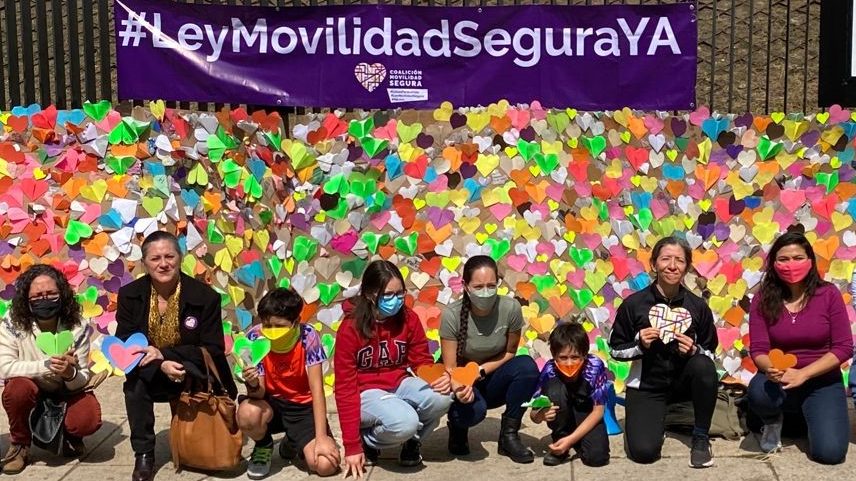
Article updated 21 April 2022
Mexico is one of the few countries in the world where safe mobility is recognized as a constitutional right. In 2020, a reform of the Political Constitution of the United Mexican States was approved to include mobility and road safety. It recognized the right to mobility and the competence of the Congress of the Union to legislate on matters of road safety and mobility. It also established people’s right to mobility regarding accessibility, efficiency, sustainability, quality, inclusion, and equality. Because the right to safe mobility is formally recognized as a right within the constitution, it has paved the way for the new General Law on Mobility and Road Safety, which was unanimously approved by the Senate on 5 April 2022.
NGOs played a key role in this achievement. The Coalición de Movilidad Segura (Safe Mobility Coalition), made up of 61 civil society organizations and experts, pushed the agenda for safe mobility rights, gaining public support all over the country. The coalition is led by Bicitekas, and Alliance members Reacciona por la Vida and Proyecto Céntrico. A number of other Alliance members, including Mexico Previene, Víctimas de Violencia Vial AC, Movilidad y Desarrollo México, and Refleacciona por la Vida and other national NGOs such as ANASEVI and Jóvenes Salvaguardas are also coalition members.
“From pain to love, we support families in their process. Our goal is to raise awareness in society and government about the terrible consequences that crashes cause to families and the economy. Let’s make visible a silent pandemic that in my country represents the loss of more than 16.000 people every year. We don’t want to remain invisible here in México. We are the forgotten victims of society and political power. We are victims who were kept out of the criminal process by an indifferent justice. This mobility and road safety bill cares about the human rights of road crash victims,” expressed Alma Chavez from Víctimas de Violencia Vial, one the members of the NGO coalition.
It has been a long journey since 2012 when the right to mobility was first established as a legal concept in Mexico[1]. Nevertheless, the 2021 milestone constitutes a new path to the discussion and approval for the General Law on Road Safety and Mobility and these final votes in the Chamber of Deputies are crucial to accomplish it. The bill on safe and sustainable mobility has been carefully prepared by the coalition under the premise that nobody should die as a consequence of a road crash, a key principle the principles of the Safe System approach recommended in the Global Plan for the Decade of Action for Road Safety 2021–2030 (Global Plan).
The Safe Mobility Coalition promoted a collaborative proposal, holding a series of working groups with experts from governments, civil society, as well as academia and the private sectors. The proposal contemplates improvements in public transportation, mandatory use of helmets, blood alcohol concentration regulations. It also proposes the creation of a National Mobility and Road Safety System. To highlight the policy switch, the law establishes a transportation hierarchy for the planning, design, and implementation of public policies, where pedestrians are prioritized, then cyclists, followed by users and providers of public transport. Finally, drivers of motorized vehicles and commercial vehicles.
During the last UN Global Road Safety Week, the coalition held walks to raise awareness for the law and people’s rights to safe mobility, organized an activation for safe crosswalks, memorial rides in memory of road crash victims, and presentation of cycling manuals to community in several cities around the country. Furthermore, they invited international experts to share experiences from other countries.
In 2018, road deaths were one of the ten leading causes of deaths in Mexico. 15,574 people lost their lives on the road. Vulnerable users were the most affected, with 23% being pedestrians.
Find more information about the coalition HERE. The proposal bill is HERE.
The Alliance’s 2020 report The Day Our World Crumbled: The Human Impact of Inaction on Road Safety called for decision makers to treat road safety as a human and constitutional right and to put people at the heart of the road system. The theme was taken up again by Alliance member NGOs in the #CommitToAct campaign under the slogan “Safety is my right”. The Global Plan also refers to the right to safe mobility in its introduction, stating that “placing safety at the core of our road safety efforts will automatically make safe mobility a human right.”
We are excited to see the right to safe mobility being implemented at national level in Mexico and congratulate the Mexican government for pioneering this concept. We hope that other countries will follow suit in coming years. Already in Chile, Alliance member Conciencia Vial has presented a formal request for inclusion into the constitutional process, based on the Mexican case. Read our article exploring the basis for road safety as a right HERE.
[1] Through the publication of this report, mobility was analyzed as a human right for the first time in the country. It explains implications in page 34: For legal theory, the commitment to recognize a human right to mobility implies the identification of the normative content of this right, in order to be able to subsequently set forth the obligations that the State has with respect to it.